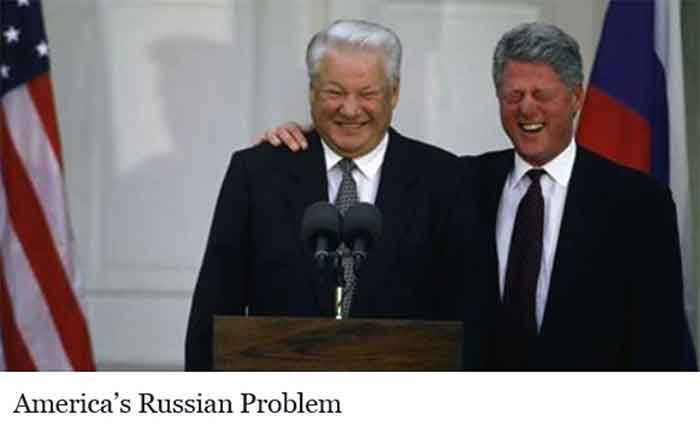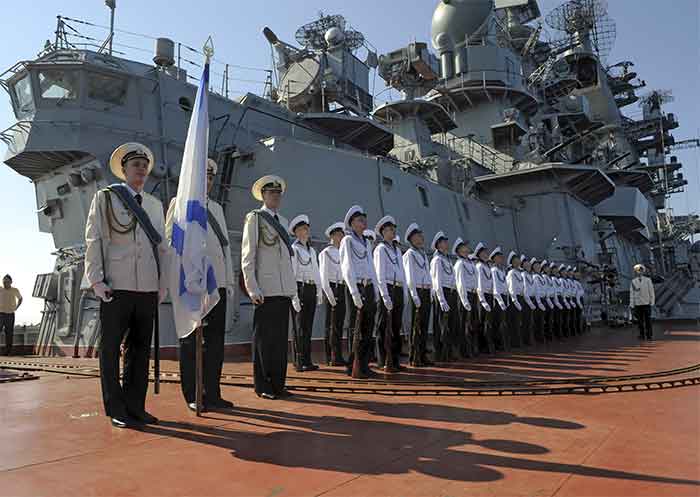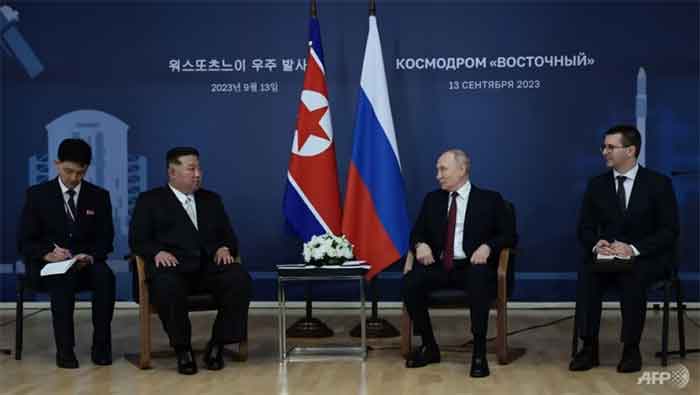
For over a century the idea of Russia (or earlier the larger USSR) as a country that is necessarily and inevitably hostile (if not evil) has taken root in the west without its rationality ever been explained in clear terms. This has led to a lot of entirely avoidable threats and risks as well as highly wasteful expenditure on the arms race. The idea of Russia as an inevitable enemy was never rooted in reality and with its persisting and increasing risks needs to be entirely reconsidered and the many myths and falsehoods surrounding this idea must be demolished to create a safer world and a safer Europe.
In recent times the idea of an inevitably hostile Russia has been promoted more to benefit the military industrial complex and to create a justification for the existence and expansion of NATO. There has been no rational explanation for this beyond such narrow thinking.
This idea of an inevitably hostile Russia can be traced back to the communist revolution of 1917. Certainly communism presented an alternative to capitalism. However alternatives to capitalism and its excesses and its distortions have been explored by some of the most noble people within the capitalist countries also and in fact these ideas finally led to some important reforms within capitalist systems which added to their strength and longevity.
It is also true that several serious mistakes and excesses took place in the Soviet Union due to which many people there had to suffer a lot. However this could not be a cause for the West to be hostile to the Soviet Union as actually more friendly relations would have helped them to contribute to correcting mistakes at an earlier stage and thereby reducing the sufferings of people.
Instead of trying in more specific and creative ways to play such a helpful role, the West instead adopted a more and more hostile role which actually obstructed the Soviet Union from progressing towards more democratic systems and strengthened the hands of more oppressive persons with dictatorial tendencies.
The tendency of treating the Soviet Union as the most hostile force found very arrogant expression in Hitler who was willing to commit his maximum resources to somehow defeating the Soviet Union. It was the very brave resistance of the people of the Soviet Union, the country which lost the most people in the Second World War, in very adverse conditions which contributed the most to saving the world from Hitler and Nazism.
Even the forced cooperation of some western countries with the Soviet Union for the shared objective of defeating Hitler did not lead to removing the idea of regarding the Soviet Union as permanently hostile, and in fact soon after the Second World War the idea of dropping nuclear bombs on Soviet Union cities was seriously considered but thankfully not implemented.
A big opportunity for improvement of relations came during the 1990s, particularly with the initiatives taken by Mikhail Gorbachev. It appeared that the response of several western leaders was encouraging initially but soon things changed all too quickly and it appeared that the western leadership was happy with only that Russian leadership which was willing to accept a vassal-like role and would go on making too many concessions to western businesses. When after Boris Yeltsin a new Russian leadership resisted this and became more determined to protect its national interests, the idea of permanent hostility towards Russia returned all too quickly. In retrospect it is clear that even at this stage with more wisdom the west could have pursued its short and longer-term interests in much more enlightened ways by engaging in more sympathetic ways with Russia and according it a place within European strategic and economic security which was in conformity with its important position and self-respect. However this was not done and instead, violating earlier promises of NATO not expanding an inch eastwards, a relentless expansion of NATO eastwards was pursued, ignoring the warnings of the west’s own senior diplomats that this would inevitably lead to dangerous, avoidable conflict situations. A final red-line was identified by them in the context of the NATO membership of Ukraine but when this too was disregarded with efforts being initiated in the direction of NATO membership of Ukraine, this red-line about which senior western diplomats had been warning came very close to be breached and hence the background of conflict was prepared.
As though all this was not enough, the USA and Britain in particular colluded to stage a coup against a reasonably neutral Ukrainian government in 2014, preparing the ground for strengthening anti-Russian forces in Ukraine, including neo-Nazi forces in particular, and creating conditions in which regimes in Ukraine were now likely to be increasingly hostile to Russia. These regimes started taking many hostile actions against the Russian language speaking people of Eastern Ukraine, resulting in the killing of nearly 14,000 of them over a 7 year period. In the beginning of 2022 they came under much increased shelling from Ukrainian forces.
This is the background in which the Russian invasion took place, and a question that should be fairly debated is regarding the extent to which the invasion that took place against this background reflects aggression on the part of Russia or the west (USA and Britain in particular).
Before answering this question another fact that should be considered is that just a few weeks into the war, Russia and Ukraine came very close to negotiating a peaceful agreement based on Russian withdrawal and Ukraine’s neutrality but this was sabotaged by UK and USA. Most of the articles, papers and opinion pieces I have read in recent times on the Ukraine war published in the west ( and I have read quite a few) have one thing in common—they almost inevitably accept the desirability of the objective of defeating and harming Russia but surprisingly, the rationale of this objective is almost never explained.
Most articles support the idea of giving more and more military aid to Ukraine. Here of course the objective of defeating Russia is quite clear. However a few articles also oppose the giving of more and more military aid to Ukraine by the western countries (this view has started getting somewhat more frequent in recent times). However even this second category of articles accept, implicitly or explicitly, that defeating Russia is of course a desirable objective. However, these articles note, often with regret, that keeping in view the reality of recent significant military reversals suffered by Ukraine, the original objective of using Ukraine to harm Russia appears to be unrealistic or unrealizable, and therefore for this reason military aid to Ukraine should be stopped. In other words, if Ukraine had done better on the battlefront, these writers too would have supported the continuation of more military aid to achieve the original objective of defeating or harming Russia.
There is something seriously wrong here with this wide but entirely irrational near-consensus on Russia as the permanent enemy attempts to harm whom are always justified and need to be curtailed only if these are not succeeding. As long as these are succeeding these are justified.
Such irrational and unjustified feelings of hostility with all their dangers have been allowed to continue for over a century, being passed from generation to generation, getting built into the system, creating an entire culture around them and acquiring a momentum of their own.
While such thinking has always been irrational, unethical and dangerous, this appears to have become all the more dangerous now. Escalation of military help of the west to Ukraine has proceeded from less destructive arms to steadily more destructive ones to the armed personnel needed for handling them or providing guidance to increasing talk of boots on the ground. Hence apprehensions regarding the increased possibilities of a direct conflict with Russia have been voiced, with all the accompanying possibilities of mass destruction.
If a much bigger war actually starts, maybe due to unintended or accidental triggers in a situation that has been allowed to remain needlessly hostile and dangerous for a long time, historians will write that a world war or a nuclear was was caused by dangerous myths of hostility that had been foolishly allowed to continue for a long time for very narrow reasons.
This is thus a very appropriate time for the west to end for all time the highly dangerous irrationality of regarding Russia as a permanent enemy for all times. A brave new beginning of peace, trust, cooperation and friendship should be made which will definitely benefit the people on both sides and which will be a big step forward for European peace as well as for world peace.
Bharat Dogra is Honorary Convener, Campaign to Save Earth Now. His recent books include Protecting Earth for Children, Planet in Peril, Earth without Borders and A Day in 2071.















































